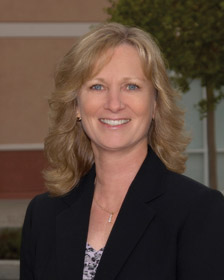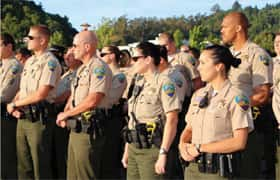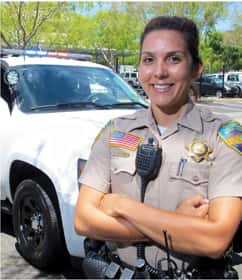North Bay institutions train candidates for careers in public safety.
In this age of digital technology, with ever-increasing innovation and services and products most of us can’t describe, are there any down-to-earth jobs out there? Jobs where a person can do good, relate to people, be physically and intellectually active and also make a living?
In the North Bay, careers in public safety—law enforcement and corrections officers, fire fighters, emergency medical technicians and parks rangers—are opening up now for people looking for active, exciting and rewarding careers helping others and keeping their communities safe.
Job opportunities increasing
“We’re seeing the industry pick back up,” says Charisse Arnold, director of the In-Service Program and Corrections and Probation Academies at Santa Rosa Junior College (SRJC). As the economy recovers from the recession and baby boomers reach retirement age, all the North Bay counties are actively recruiting to fill vacancies. Arnold says the California Department of Corrections and Rehabilitation is looking to fill 8,000 correctional officer positions by 2016. “They need people tremendously.
The SRJC Public Safety Training Center offers training for all aspects of public safety and law enforcement careers. “We’re a vocational institution,” says Arnold, “so many of our students train for a short time and can then be out working. Some are students who just open the catalog, find the academy and take the five-week course.” Others may already be employed by an agency, which pays their tuition. “So they come both employed and not-yet-employed, hoping to be out in the workforce in a short period of time.”
Arnold handles training for the new dispatch, juvenile corrections, corrections and probation candidates. She also handles all the refresher training for current peace officers, who are required to obtain 24 hours of training in certain subject matters every two years. She’s training the people who work in many of the public safety disciplines.
“When the deputy sheriff or police officer rolls up in the car with somebody in the back seat, they take them out and transfer them across the threshold of a jail. Once the inmate comes into the facility, it becomes the job of correctional officers to provide what they need to be safe and secure in the facility.”
People in these positions need to have a certain personal balance, compassion and an ability to relate in a variety of situations. Most important, they must be able to manage crisis. This is covered in the training. “Each job has its own academy,” Arnold says. “So the juvenile corrections officer would have a four-week, 160-hour academy.”
The probation officer takes a five-week course, just shy of 200 hours, to learn tactical communications and arrest-control techniques such as “verbal judo” (how to control a situation using the least amount of force by talking to somebody). Candidates are trained in the “use of force spectrum” so they can manage in the event the verbal approach fails, to using their hands, then the baton, pepper spray, and “all the way up to deadly force.”
“So when they go out on the job,” she says, “they have the basics of what they need. Then they often train more—when they get to any given facility—through a field training program.”
Interest in training remains steady
 “We don’t have a problem getting recruits,” says April Chapman, dean of public safety and director of the SRJC Public Safety Program. “When the economy was down and counties had funding problems, we had students putting themselves through the program,” she says. But in the last year, she’s seen an increase in the number of students who’ve already been hired by an agency and who are going through the academy, paid by their agency, to get certified as required by the state of California.
“We don’t have a problem getting recruits,” says April Chapman, dean of public safety and director of the SRJC Public Safety Program. “When the economy was down and counties had funding problems, we had students putting themselves through the program,” she says. But in the last year, she’s seen an increase in the number of students who’ve already been hired by an agency and who are going through the academy, paid by their agency, to get certified as required by the state of California.
How hard is it to get hired?
Candidates wanting to apply must take an orientation and also be tested for reading and writing skills. “If they don’t pass,” Chapman says, “they don’t get into the academy.”
Passing the academy courses isn’t a hiring guarantee. In addition to completion of required coursework, people have to pass a background check, which is conducted by the hiring agency. Chapman says that any history of cheating, drug use, stealing, lying, other unethical behavior any felonies won’t be tolerated in a candidate for a law enforcement position. It’s therefore to both the agency’s and the candidate’s advantage to have the background check completed before he or she enrolls in the academy. “Students can get straight As, but if they can’t pass a P.O.S.T. (Peace Officer’s Standard and Training) background, they’re not going to be hired,” says Chapman. “And that’s become a large problem for many candidates.”
Each law enforcement agency has different needs, but all share minimum standards. The background check, which all agencies conduct on applicants before hiring them or sending them to the academy for certification, is extensive, and takes into account an applicant’s credit record as well as their life history. Agents talk to neighbors as far as 20 years back. They’re looking for a true picture of how the candidate lived and learned from experience. The reason for this is obvious, says Chapman. Working in public safety, you have a huge amount of responsibility and must engender public trust. You also have the risk of exposure in the press if something goes wrong. “So if you lack integrity,” she says, “things can go very wrong very quickly.”
“The ideal candidate will have healthy life experience,” says Napa Valley Police Academy Director Damien Sandoval. “They’ll have learned from their experiences, both good and bad, and will have demonstrated solid ethical decision making throughout their lives. They’ll have shown a growth path—a pattern of having learned from their experiences.” Finding out about a potential candidate’s character and experience is a chief aim of the extensive background checks the agencies carry out. “Agencies aren’t looking for someone who’s mistake-free, but rather someone who’s learned and grown as result of his or her experiences.
“We have a zero tolerance policy with honesty-related issues,” continues Sandoval. “If we experience any  level of dishonesty, we get that person out of the program. If we experience any substance use or abuse issue, we get that person out of the program. Then there are assessments and tests for the cognitive skills and acuity to do the job. It’s really complex.”
level of dishonesty, we get that person out of the program. If we experience any substance use or abuse issue, we get that person out of the program. Then there are assessments and tests for the cognitive skills and acuity to do the job. It’s really complex.”
“We cannot hire applicants with a felony conviction,” says Sergeant Mitch Mana, of Sonoma County Sheriff’s Department. “Potential disqualifying factors could include but aren’t limited to financial issues and drug and alcohol use. He says candidates shouldn’t be afraid of sharing their information, as the background checks are completely confidential. “Whatever they share with us is confidential. We don’t share personal information with anyone.”
He also encourages people to understand that while there’re some disqualifying conditions, they are not looking for perfection. “We’re not looking for angels,” he says. “We’re looking for good, decent people who want a challenging and rewarding profession here at the Sheriff’s Office.” He offers himself as an example: “I’ve been with the Sheriff’s Office for 20 years,” he says. “We’re the same people you sit across from at dinner. We’re part of this community and we’re proud to work with and for our community. We’re proud to perform all facets of law enforcement.”
His advice to those who want a challenging, rewarding career in law enforcement is basic common sense: “Use your time to learn as much as you can about the job listing or career path that interests you,” he says. “The better prepared you are, the better your odds for successfully entering the profession.”
Napa training for many counties
Napa Valley College Criminal Justice Training Center is the regional law enforcement training center for Napa and Solano counties. “We train individuals who go throughout the state to work,” says Sandoval. “We have agencies as far away as Southern California that send people here. We also train people who are non-sponsored [not yet hired by an agency] and who are looking to get the academy certification so they can become officers and work anywhere in the state.
“We’re a very high-discipline, moderately stressful program that’s very demanding for students but prepares them well,” he continues. “People should know that, when they leave our program, they’re well-prepared for success in the field.”
This training is their first step; there are many more to follow. “The job of police officer is so complex that, after they leave here, they’ll go for another 12 weeks of rigorous training. We have very high academic standards and very rigorous physical standards. We hold our students accountable,” he says. These high standards appeal to recruiters. “We have a lot of recruiters coming every week to talk to cadets, urging them to apply [to their agencies].”
Recruitment efforts widening
“We’re going to colleges and universities, looking for people who want long-term careers,” says Sergeant Scott Harrington, recruiter for Marin County Sheriff’s Office Professional Standards Unit. “We’re looking for people who want to make a positive impact on the community,” he says, “independent thinkers who are here for the right reasons. They want to help people and make a difference—to make a positive impact in the community.” His team carries the message that working in law enforcement isn’t just a job, it’s a vocation.
Right now, the department is hiring for all positions in the Sheriff’s Office, so the organization will stay strong as the older officers retire. “We want to make sure people are fresh when they come in, not burned out from over work,” he says.
“It’s a great feeling when you can help someone,” he continues. “When you can get them out of an unfavorable circumstance and know you’ve done something positive.”
Good communication is key
The sheriff’s office seeks to put a value on education as well as life experience. It wants its officers to truly commit to the profession (as opposed to just doing a job). “We’re trying to build relationships with colleges and universities to get their top students,” says Harrington. A college degree, while not mandatory, is encouraged. “It’s becoming more prevalent. We’re seeing more candidates now with college degrees than in the past.”
Police work, when done well, is intensely personal, he says. “The biggest thing is: Can you speak to people?” Talking calmly and with empathy can deescalate volatile situations. “If I’m doing my job correctly,” he says, “I’m not going to need to put my hands on people. I need to be able to just talk to them, try to get through to them. I think if all our officers are able to relate to people and communicate clearly, it’s going to be a lot easier.” He’s looking for candidates who can relate to people and engage in conversation across social and racial boundaries.
To cultivate diversity awareness, the Marin Sheriff’s Office teaches a course on communicating across different racial and socioeconomic groups. “It’s about just talking to people and realizing that what you say will be heard differently by people raised in different groups. It’s about getting a message across clearly without offending anyone.”
He acknowledges this skill is especially important now, when questions of police brutality seem to dominate the evening news. His guideline for how a cop should behave is very personal: “I always think ‘How would I want a cop to behave if he or she stopped my wife? How would I want her to be talked to?’”
Firefighting in the 21st century
 “[This career] has become much more certificate- and experience-driven,” says Randy Collins, director of fire technology for SRJC. “When I first expressed interest in firefighting, it wasn’t a well-paying job. Things have very much changed since then.”
“[This career] has become much more certificate- and experience-driven,” says Randy Collins, director of fire technology for SRJC. “When I first expressed interest in firefighting, it wasn’t a well-paying job. Things have very much changed since then.”
One basic change is due to changes in social structure. “It used to be that one parent worked and one stayed at home,” he says, “which allowed time for one spouse to become a volunteer fire fighter.” That’s no longer the case. Now, typically both parents work. And the hours required of a volunteer have increased, with departments requiring more and more training. “So it all becomes a time-crunch,” he says. “If you have trouble meeting childcare requirements at home, for example, it’s going to be difficult for you to commit to the training you need to become a volunteer firefighter—to respond to calls and all of that. So it’s become difficult to become a volunteer simply from a time standpoint.”
“Now,” he says, “we’re more likely to have young adults come through, and we’re only going to have them, for the most part, until they get their first full-time job.”
Even with that demographic, he says, there’s competition. So most departments that use volunteers (or reserves—they use those terms interchangeably) will offer some type of stipend for a volunteer to come down and spend time during a drill. Some will even offer “stipend shifts,” where volunteers get paid a small amount to spend the night or a full 24 hours at the fire station.
Pursuing a career as firefighter isn’t easy. When Collins was starting out, it took him 18 months of  applying before he got a job offer. “Once someone gets a firefighting job, they usually only leave because of a retirement or injury,” he says. “A job with such low turnover isn’t going to have a lot of openings.” But things are changing as baby boomers are retiring, so many more positions are opening up. “People coming into my academies now stand a better chance of getting a job more quickly than when I was entering the field.”
applying before he got a job offer. “Once someone gets a firefighting job, they usually only leave because of a retirement or injury,” he says. “A job with such low turnover isn’t going to have a lot of openings.” But things are changing as baby boomers are retiring, so many more positions are opening up. “People coming into my academies now stand a better chance of getting a job more quickly than when I was entering the field.”
The key is to have perseverance, he advises. “Getting a firefighting job is very competitive. To get a job, most people will have to have the right educational qualifications—firefighter one and EMT certification—and you have to be pretty aggressive in applying to all departments that may be hiring.
He looks for people who’re not just good at the job physically, but also compassionate, caring and trustworthy. “A firefighter is going to be called to help people on one of the worst days of their lives,” he says. “You want people with integrity and who have very high moral standards.”
Making a difference
The rewards of a career in public safety or law enforcement boil down to the basic things most people want in quality of life: meaning, purpose, camaraderie, decent pay and benefits, variety and, in many cases, excitement and challenge. The people interviewed for this story are all passionate about what they do and about bringing in new people who are well trained and motivated to be part of the community, part of the solution, to make a difference. And the good news: The training is available right here and the counties are hiring.
Portrait of an Action Hero
“When there’s a medical emergency, people are typically very upset, says retired EMT, paramedic and firefighter Mark Jones of St. Helena. “You go into a place where there’s just chaos and it’s your job to calm everything down. You end up working on the patient and on the family [or bystanders] at the same time. You change the whole story of what’s going on when you step over the threshold of that situation.”
Jones’ desire to help people developed early. His mother was a nurse and when he was in high school, he volunteered for the Red Cross at the Sonoma County and Petaluma fairs.
“To me that was so exciting—to be racing through the crowd with the medical box and come up to somebody who’d collapsed, and say, ‘I’m here to help, what’s going on?’”
At the time, Jones was attending an x-ray course at SRJC but he found it confining. “I realized I wanted to work both inside and outside. I wanted a job where I could do physical stuff but also have to use my brain.”
 He became an EMT and paramedic and, for the first 20 years of his career, worked for a private ambulance company as crew chief, then a field training officer, training incoming paramedics. After 20 years, he decided to become a firefighter. The pay and benefits are significantly better, the adventure he craved was there and, as a paramedic, he had an advantage over most applicants. He was hired in South Lake County in 1992, as a firefighter/paramedic and loved it from the start.
He became an EMT and paramedic and, for the first 20 years of his career, worked for a private ambulance company as crew chief, then a field training officer, training incoming paramedics. After 20 years, he decided to become a firefighter. The pay and benefits are significantly better, the adventure he craved was there and, as a paramedic, he had an advantage over most applicants. He was hired in South Lake County in 1992, as a firefighter/paramedic and loved it from the start.
“The fireman end of it is really satisfying,” he says, “but as a paramedic, it’s really great to be fighting a fire, find someone and be able to pull them out and not have to wait for a paramedic to treat them. You’re already there!” So the job was doubly rewarding, he says: “I got to do all the stuff I like to do.” This included snowcat rescues, and, once, jumping out of a helicopter and hanging a rope for a “short haul” rescue. He worked at the department until 2014, when, 10 years after retirement age, his back finally gave out.
Reflecting on his career, Jones says it was never dull. “There’s always adventure. I’d go to work, come home and always have stories to tell.” Of course, much of the adventure involves an element of tragedy. “But you learn to work with that,” he says, “and thrive on the good stuff.”
Today, even with a bad back, he can’t keep himself from helping out with local fires. “It’s fun, it’s exciting, you can do good stuff for people all the time. It’s very rewarding psychologically. People are always glad to see you.”
Getting a Job as a State Parks Ranger
Another less-often considered law enforcement career is the state park peace officer (aka ranger). The California Department of Parks and Recreation manages 280 properties including state parks, natural reserves, historic parks and monuments, shorelines recreation areas, vehicular recreations areas and marine parks. If you want to spend your days in nature, this could be path to pursue. Opportunities include state park ranger cadet and supervising state park ranger.
An applicant must have two years of college, a valid driver’s license, be physically fit, at least 18 years of age, pass a comprehensive background investigation, be a U.S. citizen or permanent resident alien in the process of applying for citizenship, have 20/20 corrected vision, 20/40 uncorrected vision and no felony convictions.
Resources
Search online for more information on public safety training and careers in the North Bay. Here are the ones mentioned in this article:
Napa Valley Criminal Justice Training Center
nvccjtc.org
Santa Rosa Junior College
Public Safety Training Center
www.santarosa.edu/ps
Firefighter 1 Academy
www.santarosa.edu/ps/firefighter-1.php
Police Academy Intensive
www.santarosa.edu/ps/police-academy-intensive.php
Sheriff’s Offices by County
Napa County
www.countyofnapa.org/sheriff
Marin County
marinsheriff.org
Sonoma County
www.sonomasheriff.org
State Parks Rangers
www.parks.ca.gov/parkjobs



